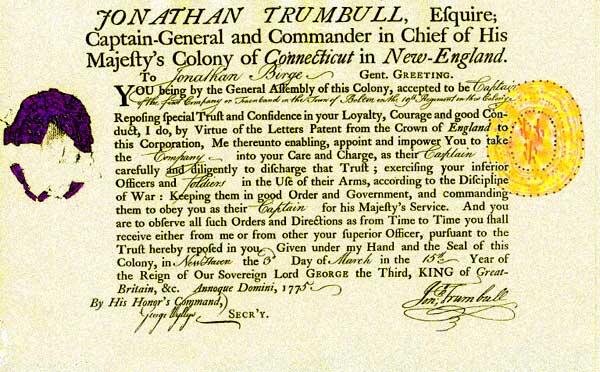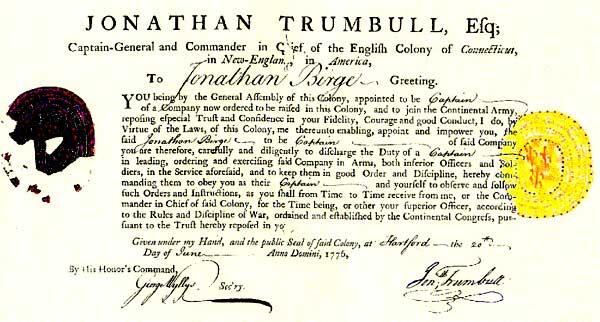by Hans DePold, town historian
(Published in the Bolton Community News, August 2002)
Jonathan Birge married Pricilla Hammond on March 24, 1763 and lived on Hebron Road in Bolton. On March 15, 1775, Jonathan Birge was commissioned a Captain in the Crown's Army. All Americans were then subjects of the Crown. Governor Jonathan Trumbull was the Crown's governor in Connecticut. Benjamin Franklin was the postmaster general for the Crown in the American colonies. But by 1775 loyalties were divided and many were already Americans first and Englishmen second.
The Lexington alarm of April 19, 1775 is considered the beginning of the Revolutionary War. It started with the ride of Paul Revere and the British attack on Lexington and Concord. State records show that 63 men from Bolton marched on the Revolutionary Road to the relief of Massachusetts Minutemen.
That compares with 45 from the much larger town of Hartford. From Bolton, Jonathan Birge and Thomas Pitkin were captains and Jared Cone and Isaac Fellows were lieutenants. The British quickly withdrew to Boston as a sea of 4,000 armed Minutemen swelled across the Massachusetts countryside and took the heights overlooking Boston and ignited the skies with bonfires.
Another Bolton resident, Herman Baker, had also served in the Lexington Alarm. Later, on May 3, 1775 he joined the 5th Company of the Second Continental Regiment and served as a sergeant. He was taken prisoner that winter at Quebec.
By 1776 the movement toward independence was gathering momentum, and Jonathan Birge was commissioned a captain in the Continental Army on June 20, 1776. General Washington then called for reinforcements and the Connecticut Assembly responded by ordering the enlistment of seven battalions commanded by Brigadier General James Wadsworth. The Third Battalion of Wadsworth's Brigade was commanded by Colonel Comfort Sage and consisted of eight companies. The Fourth Company consisted of volunteers from the Bolton-Tolland area and was commanded by Captain Jonathan Birge. Herman Baker was paroled from prison in August 1776 and immediately returned to Bolton and enlisted and served under Jonathan Birge as a corporal.
Captain Birge's Company traveled the Revolutionary Road and in September of 1776 fought in the battle of New York, resisting a full-scale invasion of British and Hessian forces under General Howe. Baker was again captured by the British on September 15,1776. Washington made a strategic withdrawal and dug in the American lines at White Plains, NY. During the battle of White Plains, October 28 of 1776, Captain Birge was mortally wounded and was allowed to try to return to Bolton. The Revolutionary Road was filled with refugees, the wounded leaving the embattled towns, and fresh troops heading for the front. Captain Birge was buried in an unmarked grave near Stamford on November 10, 1776. He never made it back to Bolton.
As a prisoner in New York, Herman Baker caught smallpox but survived to be released in January of 1777. In his weakened condition he traveled the Revolutionary Road only to die on January 21, 1777, one day away from his home. I visited his grave next to Willow Brook on Willow Brook Road in East Hartford. The location is just inside the Pratt and Whitney property just east of the first pumping station.
Recently, Jonathan Birge's 1775 and 1776 military documents were offered to me for purchase for $20,000. That was a little steep even for my salary as Bolton Municipal Historian. I managed to get pictures of the papers and scanned them in the computer for our town records (see below).

